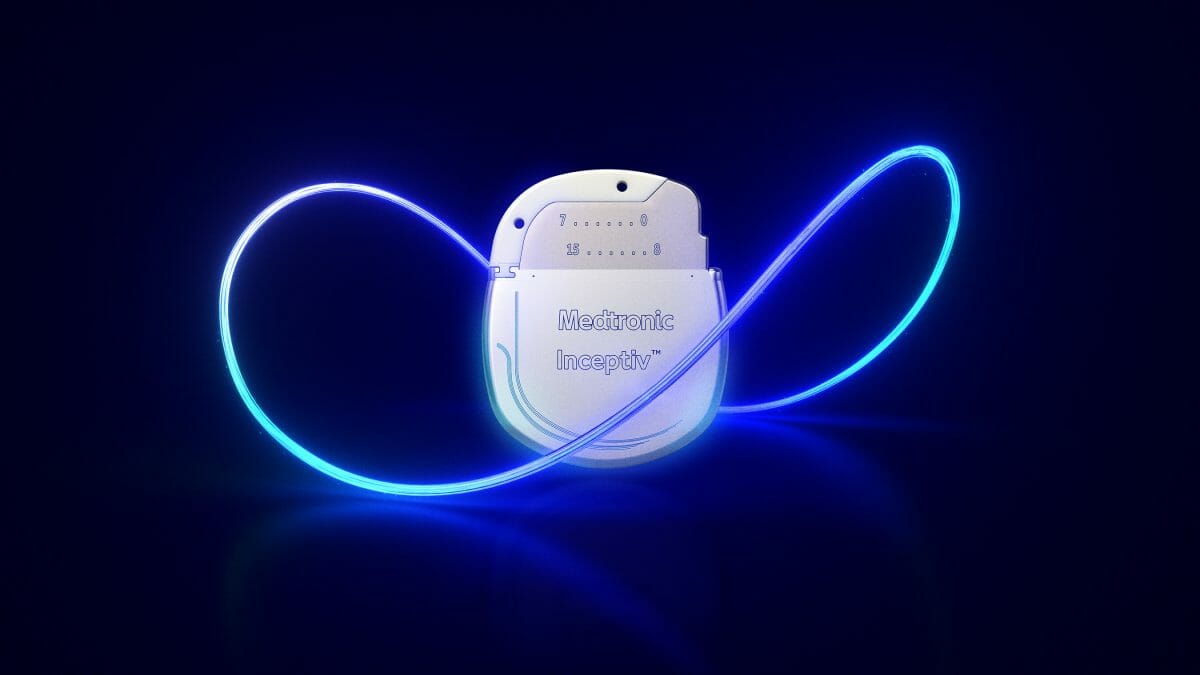Medtronic plc (NYSE:MDT), a global leader in healthcare technology, has received CE (Conformité Européenne) Mark approval for its Inceptiv ™ closed-loop rechargeable spinal cord stimulator (SCS). It is the first Medtronic SCS device to offer a closed-loop feature that senses each person’s unique biological signals and adjusts stimulation moment to moment, as needed, to keep therapy in harmony with the motions of daily life. †
Spinal cord stimulators deliver mild electrical impulses to the spinal cord, which can disrupt pain signals before they reach the brain. As patients go about their daily lives, certain movements may result in uncomfortable stimulation. This in turn may lead some patients to turn down their device’s stimulation output, resulting in a suboptimal therapy experience. By contrast, Inceptiv is able to sense the body’s neural response to stimulation 50 times per second, every second of every day. When neural response increases, such as when the patient coughs, sneezes, or bends, Inceptiv automatically decreases stimulation. As neural response decreases, stimulation returns to the pre-set optimal level. This is done seamlessly to provide consistent therapy while patients perform a full range of daily activities.
“Today, fixed-output spinal cord stimulation does not account for patient movements, which can alter the distance between the spinal cord and implanted epidural leads,” said Dirk Rasche, M.D., from the Department of Neurosurgery, University Hospital of Schleswig-Holstein in Lübeck, Germany. “This can compromise the patient´s experience and therapeutic effectiveness. The Inceptiv closed-loop feature will allow for a more consistent and optimal delivery of therapy, and reduced need for manual programming adjustments by the patient. Together with the compatibility of multiple types of waveform options, inclusive of DTM™ SCS, and industry-leading MRI access, I believe this latest generation of rechargeable neurostimulator represents a significant leap forward in SCS therapy and a milestone of modern neuromodulation.”
The Inceptiv device utilizes a closed-loop capability with ECAPs (Evoked Compound Action Potentials), resulting from decades of Medtronic research and development to unlock the ability to listen and respond to signals along the spinal cord. ECAPs are a direct measure of how much neural tissue is activated in the spinal cord in response to electrical stimuli, providing real-time information that enables the system to respond to patient movements. In a clinical study, 9 out of 10 patients preferred the optional closed-loop setting compared to fixed-output stimulation.1
“Medtronic pioneered SCS for pain management more than 50 years ago, and we continue to deliver new innovations that personalize care and improve pain relief for patients,” said Ash Sharan, M.D., chief medical officer, Neuromodulation, which is part of the Neuroscience Portfolio at Medtronic. “This approval marks the beginning of a new era of pain relief, using sensing technology to listen to the unique biological signals of each patient.”
The Inceptiv neurostimulator is the only SCS system in Europe offering both full-body 1.5T and 3T MRI access.‡ Most people with SCS will need an MRI within five years of receiving their device.2 Inceptiv is also the thinnest SCS device in the world at just 6mm, and it offers the proven benefits of Medtronic’s proprietary DTM™ spinal cord stimulation. The system’s battery can be recharged from empty to full in approximately one hour.
The Inceptiv SCS system will be commercially available in the coming months in Europe but is not approved for sale or distribution in the United States.
† Sensing signals may not be measurable in all cases.
‡ Under certain conditions. Refer to product labeling for full list of conditions.
